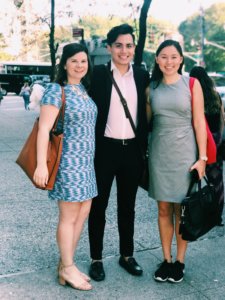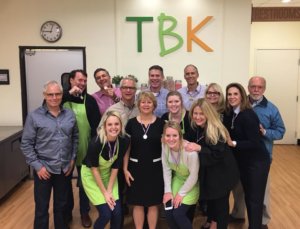What’s Next: PR, Post Grad
Published on December 11, 2017, at 6:57 p.m.
by Caitlin Heffley.
“What do you want to be when you grow up?”
For young children, this is a common question that often evokes answers of all kinds. As people grow older and their interests narrow, perhaps the questions become more short term, such as “What are you going to study?” or “Where are you going to college?”
Something happens when individuals near the end of their college careers, though, as if life has come full circle. They find themselves asking the age-old question once again: “What do I want to be when I grow up?”
For those entering the public relations field, this is not necessarily a black-and-white answer. Unlike the often straight and narrow paths offered by many college majors, the avenue for public relations students is not necessarily a one-size-fits-all — evident through the vast array of fields and opportunities into which the PR graduate can delve.
On the other end of the spectrum, the public relations industry is not a discriminatory one, so to speak. Students with advertising, marketing, communication studies or business degrees might all find themselves writing press releases, conducting research or building “mutually beneficial relationships” in their first jobs out of school.
With so many options available, professionals at insidejobs.com suggest that the best way to figure out the next step is to go “anywhere that will give you an internship. Internships are a great way to learn the job you’re going for, and to get your foot in the door.”
That is just what two particular college graduates did.
Fresh out of college
Sarah Grace Dougherty graduated from college in May of 2017 as a double major in public relations and Spanish. She landed her first job as a client staff assistant with Burson-Marsteller in New York City.
Her responsibilities, including but not limited to media monitoring and drafting pitches, remain generally consistent; however, Dougherty pointed out that the job is ever-changing, even on a day-to-day basis.

“It really depends on the news cycle and corporate initiatives in place on any given day — never a dull moment!” Dougherty said.
With dreams to eventually become the CCO of a fortune 500 company, Dougherty felt that despite countless other opportunities available to her, the job with Burson-Marsteller would be the best platform for her to launch her career and achieve her long-term goals.
But how did she even come to this decision? Throughout college, Dougherty maximized her opportunities and embraced all different forms of experience — freelance writing, leadership in campus organizations and working summer internships — which, she says, eventually aided her in the postgraduation process.
“It was really helpful for me to experience the freelance/startup side, corporate environment and agency lifestyle before it came time to apply and eventually accept a job offer,” Dougherty said.
The recent graduate also stressed the importance of networking, interviewing and relationship building during one’s journey to landing that first job. She noted that these strategies are not only meant for the purpose of getting hired, but also for learning about the field and finding out where personal passions and interests lie.
To those finding themselves in a similar position to hers, Dougherty offers this wisdom:
“Worry less. Sure, easier said than done, but I think we all put too much pressure on ourselves as the internship and job search progresses. Everyone will find the right next step for them in the right timing.”
While Dougherty’s path certainly seems to be successful for her, other students might find that their postgrad season carries with it a few more bumps and twists in the road.
A few years under the belt
Alyssa Leigh, a 2014 graduate of The University of Alabama, studied advertising and consumer sciences, but in the last four years, has found herself in three different work environments, with mainly public relations responsibilities.
In her first postgraduation internship with a large marketing firm in Dallas, Leigh conducted market research and worked in the firm’s promotional department. She soon realized, however, that this was not a career in which she could see herself thriving; thus, she left the firm to pursue a job with a local nonprofit.
The recent college grad had dreamt of someday starting her own nonprofit, so gaining experience in this area was something she knew would benefit her. Of the transition, Leigh noted, “A huge difference between the nonprofit world and the agency/firm world is the number of hats you wear.”
The seemingly increased workload turned out to be a blessing in disguise. This was where Leigh’s public relations experience truly began. In the next two years, she was responsible for writing and distributing newsletters, managing social media, and getting hands-on experience, all of which contributed to her main purpose of building relationships with the organization’s audiences.
Leigh developed her knowledge and expertise of nonprofit, service-oriented work, and a short time later, accepted a job with a larger nonprofit organization in Dallas, doing all of the same tasks but on a more magnified scale.
Although three jobs in four years certainly required some adjustment, Leigh says she wouldn’t trade it.

“Fully immerse yourself and learn as much as you can because I promise, there will be sometime down the line when that random task you did ends up being the missing piece in a project and you know how to fill in the gap — that’s valuable,” Leigh said.
She also pointed out the invaluable benefit of working in a field with so much fluidity and change. Without the ability to try on these different “hats,” Leigh may have never discovered her true talents and passions, which have been the driving force behind her success.
Her advice for soon-to-be graduates?
“We all have to start at the bottom … change is OK, and fortunately this is an industry that values differences of opinions and life experiences — be excited about and thankful for that,” Leigh said.
Through the examples of these two PR professionals, one thing is certain: public relations is not cut-and-dry. According to Forbes.com, “Today’s PR requires an integrated approach that goes well beyond traditional strategies.” Perhaps the fluidity and constant evolution are what makes the public relations industry so attractive to prospective students and college graduates alike.




